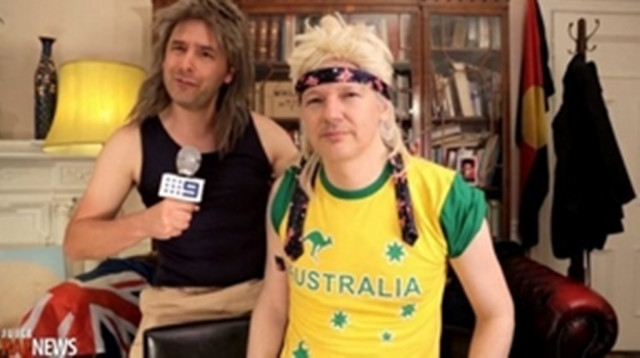WikiLeaks' Assange leads offbeat race to Australian polls
The 42 year-old says his chance of winning a seat in the Senate was promising.

Assange, who has been living inside the embassy since June 2012 as he fights extradition from Britain to Sweden, has been unable to campaign Down Under but has got into the spirit with a spoof video.
Sporting a blond mullet wig, short on top but long in the back. PHOTO: AFP
When Australians go to the polls on Saturday, a mandatory exercise for all adults, they will have 1,717 candidates from more than 50 parties to choose from.
They include the usual sprinkling of former sports stars, far-right fringe groups and everything from the Animal Justice Party to the Smokers' Rights Party and The No Carbon Tax Climate Sceptics Party.
From Ecuador's embassy in London, the Australian-born Assange leads a party that hopes to bring "transparency, accountability and justice" and potentially become a global movement.
Assange, who has been living inside the embassy since June 2012 as he fights extradition from Britain to Sweden, has been unable to campaign Down Under but has got into the spirit with a spoof video.
Sporting a blond mullet wig, short on top but long in the back and with Australian rock star John Farnham's 1986 hit "You're the Voice" playing, Assange sings of making things "leak so we can get much bolder".
The WikiLeaks Party, the lyrics say, is "the light that the world's demanding, make it bright and make things clear".
The 42 year-old, who co-founded the whistleblowing WikiLeaks website which went on to dump hundreds of thousands of US military and diplomatic documents online, says his chance of winning a seat in the upper house Senate was promising.
"There's many Australians who support us," his father John Shipton, who helped form the party, told AFP at a recent Sydney fundraiser.
"The Senate of Australia is one of the world's finest political institutions. It's a house of review and has, despite the two major parties trying to fill it up with cabbage heads from time to time, had an excellent influence on politics generally.
"So we wish to extend that influence... and bring accountability and transparency and thus justice to issues."
Playing on deep dissatisfaction with the major players - the ruling centre-left Labor Party led by Prime Minister Kevin Rudd and the conservative opposition Liberal/National coalition headed by Tony Abbott - new parties have emerged to take their share of the vote.
"They are so boring those guys," said Clive Palmer, the flamboyant businessman best known for his project to rebuild the ill-fated luxury liner the Titanic. He is standing for a seat in the lower house of parliament.
"You've got Kevin Rudd that is more concerned about his hair than the benefit of the Australian people and Tony 'Rabbit' who just doesn't want to talk at all," he said, using his nickname for opposition leader Abbott, the election frontrunner.
"Everyone knows they're boring and everyone now is searching for a solution. And we've got that solution."
His fledgling Palmer United Party is standing a candidate in each of the 150 seats in the House of Representatives and teams in the Senate as it spreads its populist message, which includes changing company tax rules.
Another renegade is Bob Katter, a 10-gallon-hat-wearing rancher from far north Queensland who has been in parliament for more than a decade as an independent, but who formed his own party in 2011.
"I know how to play this game and we will play it with a fair degree of ruthlessness," Katter, who champions rural issues, said recently.
Pauline Hanson, founder of the anti immigration One Nation party who rose to prominence in the 1990s, has also thrown herself back in the ring, saying Australians deserve better than "selfish, dysfunctional, egotistical political parties".
Rob Manwaring, a lecturer in politics at Flinders University in South Australia, said there was "no chance of any significant vote breakthrough" for WikiLeaks and that the smaller parties would struggle for any influence.
But he said: "In general, the share of the vote for minor parties has been increasing for a number of years... so we are seeing a shift in voting behaviour."



















COMMENTS
Comments are moderated and generally will be posted if they are on-topic and not abusive.
For more information, please see our Comments FAQ